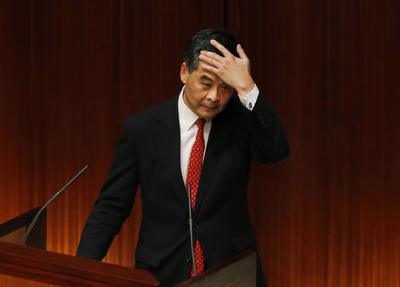The march showed growing public dissatisfaction with the non-popularly elected government and the abuse of police power, alongside people’s determination to defend Hong Kong’s political autonomy from China.
The marches mark the anniversary of the establishment of the Hong Kong Special Administrative Region, which has been under Chinese rule since 1997, and coincided with the inauguration of Hong Kong’s chief executive. This year’s protest was dominated by loud and clear calls for Beijing-approved Leung Chun-ying to step down. The huge turnout in the hot summer afternoon is a clear marker of political distrust and anger, primarily directed at the political and personal integrity of the new chief executive.
In June, when Time magazine asked, ‘Can Hong Kong Trust This Man?’, the support rating of Leung stood at 51.3 per cent. Voices condemning collusion among the Communist Party of China, the Hong Kong government and business conglomerates were frequently heard throughout the protests, and suggest that Leung’s popularity has not improved dramatically.
The fact that Leung was appointed after getting only 689 votes in the 1200-member Election Committee, and his close ties with Beijing have driven many to doubt his willingness to defend the territory’s political autonomy.
Demonstrators expressed their distrust and anger over the police’s lack of restraint in handling protests, the frequent and unnecessary use of heavy-duty pepper spray, and the ban on holding protests at the China Liaison Office. The Anti-Express Rail Protests of two years ago have given rise to shows of public defiance with an emphasis on direct action. This year’s protests were very much in that spirit. For example at bottleneck points, protesters succeeded in challenging police restrictions to the route of the march.
Protesters have not yet developed the type of effective solidarity that characterises a fully-fledged social movement. The large number of protesters not affiliated with any particular organisation who attended the marches, and the fact that thousands of demonstrators diverted from the official route to protest at the China Liaison Office shows a lack of central and organised leadership. Protesters belong to a wide range of social groups, who attended the march to express their concern for what they see as negative political developments in the territory.
Of key importance in this year’s marches was the growing criticism of China’s intervention into Hong Kong affairs and human rights conditions in the mainland. Protesters complained that the China Liaison Office has interfered in Hong Kong for too long, for example by coordinating and manipulating the chief executive elections. The recent ‘suicide’ of labour activist Li Wangyang in China further accentuated concerns about human rights conditions in China and Hong Kong. This echoed a poll conducted in Hong Kong last June, which found that only 51.2 per cent of respondents were confident in the ‘one country, two systems’ policy.
It is unlikely that the Hong Kong and the Chinese governments will take direct action to curb the rising political protests in Hong Kong, particularly not until the completion of the Legislative Council elections in September this year. Any repressive measures would arouse even stronger antipathy among the people and this would, in turn, hamper the prospects of pro-Beijing candidates and the pushing through of the unpopular National Security Act under Article 23 of the territory’s Basic Law.
So, for the time being, Leung Chun-ying and his government are left to focus on the imminent tasks of governance. They are likely to continue to employ populist strategies to win the hearts and minds of the people, but his — and the territory’s — political prospects, will be put to test in the months ahead.
Wai-man Lam is Assistant Professor at the Department of Politics and Public Administration, The University of Hong Kong.


The fundamental problem is that CY Leung was not elected by a universal suffrage type of election. He was picked by Beijing to be appointed under the guise of a small circle election wherein only less than 1200 selected individuals can vote. How can you then convince H K people is he their elected Chief Executive.
H K people don’t expect him to last until 2014. China has to think twice to have him stay in office. I like most people in H K want him to quit. We want a universal suffrage type of election in 2017 instead of a pseudo-election.